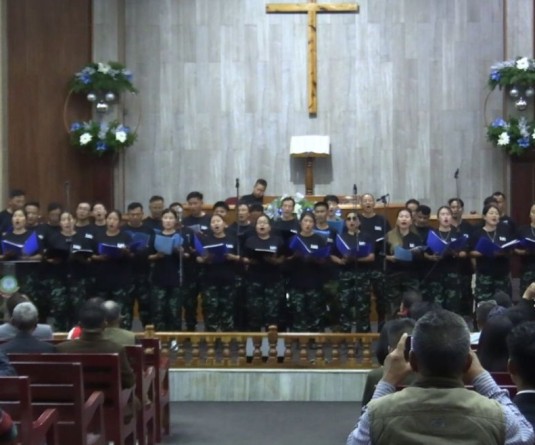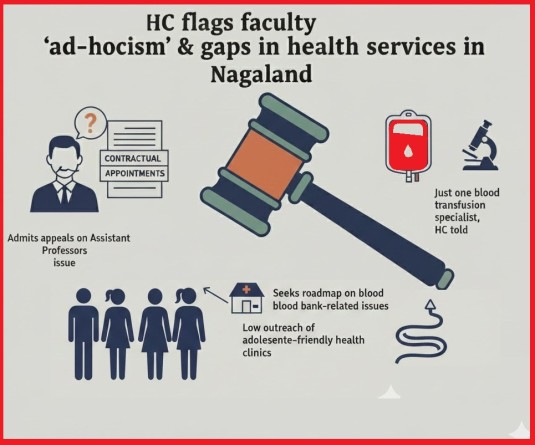
Y Merina Chishi
Dimapur | January 31
With the election a mere few weeks away, politicians have probably already made many promises to garner votes. Development is no doubt on the cards. But do our politicians look beyond these half-assured promises and bounden responsibility? Sadly, the public no more see these elections as a means to achieve something substantial. There are lots of issues to be addressed and brought out beside development, but the rate of development is considered slow that the people are not in the mood to discuss their expectations.
The youth have a stake during elections and many hope that there will genuinely be better leaders. Obed, a social worker, along with hundreds of anxious voters have been spreading the message of fair election. They have plainly told their candidate that they will not sell their votes and that the candidate should not entertain any youth with money. “Money is everything for the politicians but we will not sell our rights,” he said. Obed added that the candidates must allow the public to distinguish their abilities.
However, there are people like Aren, student and woman coordinator of the ANSU who have no positive view about the election. “It is all about the money, and unexpectedly but honestly” she said that, “it is the voters who are not genuine and they are the ones who encourage politicians to shell out money”. Nevertheless, being a student representative, Aren says that the postponement of exams will severely hamper the passing out batches. “Those who want to go out for further studies lose out on the opportunity because results are declared late. Come election or not, exams must be held on time.” She says. Aren also adds that politicians should take the youths more seriously and not to give them false hopes.
There is no reason to state why almost all sections of the society have a lot in common when it comes to their expectations from politicians. Dr. Temsu said that “politicians are not sincere and they lack principles. They do not practice what they preach”. The doctor also believes that a right person, at the right time, in the right place is the ideal man of the hour. Apart from the clichéd speeches from politicians, Dr. Temsu has concerns for his fraternity. He feels that specialists are going a-waste. “How can the government out-post a professional to places where he cannot utilize his skills. We have the manpower but nor the infrastructure and its time the next man take this issue into consideration.” The doctor also gave quite a big thought by advising politicians to separate politics from business. Politicians, it seems need more counseling before they fight it out. Atoho said, “We have a fundamental right to development. That is not an issue”. He said that Nagas on the whole have lost integrity and politicians most need this quality. He senses the need for visionary leaders who can formulate policies that can take the people forward with the rest of the world without losing the Naga identity. Atoho, who is the convener of the Naga Peoples Movement for Human Rights (NPMHR) says that politicians should not mix electoral process with the peace movement. Stating that some politicians might use this volatile state of affairs to their advantage, he further appealed to all politicians to “play politics that can keep us united and integrated and not to further one’s position.”
A group of young professionals working in Delhi say that Nagaland is losing out in the education system due to snail-paced ambitions of Naga politicians. “Our politicians don’t know how to find the permanent remedy and are simply looking for short cut solutions…” says one of them. Some of the main issues that concerns them most are corruption, school and college dropout rates and the Naga peace process.
A very vocal lady says, “Everyone knows why Nagas are in a state that it is today but you cannot expect someone like me to make the difference. It has to come from our leaders. And honestly, they’re only talking big and busy minting money.”
From the point of view of the educated class it all seems too critical, but surprisingly the lower income groups overshadow it all. Ramkaram, who runs a grocery shop in town says, “Don’t expect anything especially when you know you will not get it.” For him, it has been eleven years in fear and disappointment; fear of the anti-social elements and disappointment from the government that cannot provide any protection. Another clothes dealer in New Market, Altaf is least bothered about the election as his name does not figure in the voters list. Most businessmen in town will vote, they say, but out of compulsion. A very rare remark was given by Kamal who said, “When people ask me how I manage to live in Nagaland, I simply say that I am earning a living. It passes off. But the Nagas have to realize that the rest of India is looking.”


.jpg)



